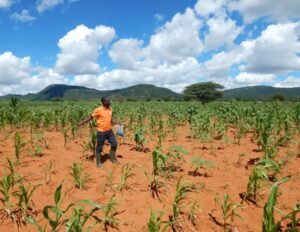By Murimi Gitari, 14 Feb 2021
Industry has urged Government to urgently address headwinds to economic recovery, following the adverse effects of the COVID-19 pandemic.
This was during the launch of the Kenya Association of Manufacturers (KAM) 2021 Manufacturing Priority Agenda (MPA), themed “From surviving COVID-19 to thriving: Manufacturing sector rebound for sustained job and investment growth”.
Speaking during the launch, KAM Chair, Mr Mucai Kunyiha, noted that economic recovery highly depends on goodwill and full commitment from government.
“Efforts to enhance our productivity are hampered by the increasing cost of doing business and low competitiveness. Some of the issues that contribute to this are regulatory over-reach, high cost of energy, transport, and logistics costs. To resolve these headwinds, it is paramount that the government and its agencies strongly commit and demonstrate goodwill to securing the future of our country’s economic development,” explained Mr. Kunyiha.
He also said that taxes are a major source of government revenue but sudden fiscal and taxation policy changes harm businesses and become a stumbling block to business continuity. The cost associated with high taxation and regulatory overreach is added to the price of a final product, thereby hindering the sector’s competitiveness, according to Mr Kunyiha.
The KAM Chair added that besides persistent high fiscal deficit, increasing public debt and regulatory overreach, manufacturers are also struggling with an inefficient transport and logistics system, causing unnecessary delays at the port of Mombasa.
“Currently, containers take more than 4 days to get cleared at the port, and cargo owners still get charged for storage and demurrage costs. The delays lead to challenges in sourcing for raw materials, forcing companies to close some lines due to interruptions in scheduled production. Additionally, the high cost of storage and demurrage fees increases the cost of doing business. We urge government to make intentional efforts towards ensuring efficiency at the port, for seamless movement of cargo,” noted Mr Kunyiha.
He explained that Kenya is not a bottomless pit of revenue and neither citizens nor institutions can be assumed to have more to give to the public purse, more so when the leakages have been estimated at an astronomical Kshs. 2 billion a day.
“This leakage of hard-earned money from workers, companies & consumers is the greatest disincentive for any tax compliance, therefore it is critical that the government provides a full account of where we direct our public spending and avoid such losses,” the KAM Chair added.
Speaking during the launch, Cabinet Secretary for Industrialization, Trade and Enterprise Development, Ms Betty Maina expressed government’s commitment to streamline its operations to create a conducive business environment in the country.
“Previously, the need for approval from different offices increased the cost of doing business and provided opportunities for rent-seeking. The one-stop-shop for service delivery for businesses seeks to resolve this, and shorten the time taken to adhere to regulations. We have also held engagements with county governments to harmonize county cess, fees and charges to reduce the cost of doing business amongst counties,” remarked Ms Maina.
The CS said the government is ensuring the implementation of Buy Kenya Build Kenya policy across the government agencies is effective and called upon the private sector to actively source locally processed products. She added that the government started an economic stimulus programme sought to ease constraints, boost demand and implement the Buy Kenya Build Kenya initiative in order to ensure business continuity.
She noted how the manufacturing sector has been a vital contributor to the national GDP and its output continues to grow steadily a year after another despite the challenges the sector encounters. Despite the hurdles faced, the CS said Kenya has proved to be resilient through the collaborative effort of both the government and the business community calling upon stakeholders to collaborate for the betterment of local industry.
She also appreciated the cordial relationship between the government and private sector, saying, “We continue to enhance our collaboration, to reach the grassroots levels, and to promote ethical business practices for our country’s economic growth.”
The MPA is an annual publication that guides the Association’s advocacy efforts with the Government and its agencies. This year’s MPA is aimed at supporting the recovery of the manufacturing sector from the devastating effect of COVID-19. While presenting the annual publication, the KAM Chief Executive Officer, Phyllis Wakiaga said their focus is built under 5 key pillars.
The first and second pillars are enhancing competitiveness and level playing field for local manufacturers and enhancing market access for locally manufactured goods both in local and export markets respectively.
Promoting pro-industry policy and institutional framework, promoting SME Development and enhancing industrial sustainability and resilience are the other three pillar the association has outlined in their Manufacturing Priority Agenda 2021.







